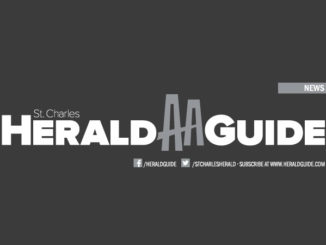
By John Maginnis and Jeremy Alford
State Sen. Bret Allain, R-Franklin, wants lawmakers to pass a constitutional amendment that would force local governments and political subdivisions to adhere to new guidelines for tax elections. The coming debate could be a barnburner, pitting the business lobby against school boards, parish councils, police juries, mayors and other local entities.
Allain’s SB 200 would require a minimum turnout of 20 percent of active voters to validate a local tax election. So even if a tax were to pass with no opposing votes, the ballot wouldn’t count if turnout was one less vote than the proposed threshold.
“If we’re going to take people’s hard-earned money, there should be a higher standard,” Allain said. He contends that local governments often schedule tax propositions during off elections, where there are no high-profile races on the ballot and turnout will be low.
“That ends up costing taxpayers more when they do that,” he said. “They pay huge amounts of money to participate in off elections.”
Local governments aren’t exactly thrilled about the idea.
“You can look at several years’ worth of tax elections and there’s no difference in how they pass based on when the elections are held,” said a lobbyist. “You’re telling voters that their vote doesn’t count. You’re leaving elections up to the guy who stays home and sits on his couch. Why don’t we apply this same rule instead to legislative elections?”
Allain said he’s prepared for that argument.
“We can’t pick when we want to run,” he said.
Economic development enthusiasts like the concept, as higher millages are always being framed as impediments to attracting major companies.
“We’re in support of the legislation,” said Stephen Waguespack, president of the Louisiana Association of Business and Industry.
Allain said he’s considering moving the bill in two weeks. When it does appear before the Revenue and Fiscal Affairs Committee, he said he’ll likely amend the constitutional amendment to include one “safe harbor” election per year where the 20 percent target would not apply.Tourism money is about control, limitsThe Department of Culture, Recreation and Tourism is facing a transitional phase, beginning with the approaching end of more than $30 million in marketing money that was granted by BP in the wake of its 2010 oil spill.
Lt. Gov. Jay Dardenne, who oversees CRT, said the last cent will be spent by the end of the current fiscal year on June 30.
“We’re down to a few hundred thousand,” he said.
While Dardenne is laying the groundwork for a post-BP money environment, he’s also battling Gov. Bobby Jindal over the use of nearly $4 million worth of so-called pass-throughs in the administration’s latest budget proposal.
The pass-throughs fund special events using money diverted from the Office of Tourism. The problem is that even though the events are promoted by Dardenne’s CRT, the lieutenant governor cannot change the individual budgeted amounts.
“I felt all along this office ought to have the discretion to decide which events warrant funding and which don’t,” Dardenne said.
As a workaround, Dardenne said he is using some of the remaining dollars from the Office of Tourism’s self-generated revenues to help underwrite the needs he has identified. In all, Dardenne is pulling about $1.3 million out of his office’s account to help fund other priorities he contends the administration has overlooked.
If he had more control over the money in his office’s account, Dardenne said he could start advertising more in other states and bolster the events that produce the biggest returns for Louisiana.Gaining and losing votersNew voter registration figures show, not surprisingly, that the most growth has occurred in a triangle-shaped area along Interstates 10 and 12 between Lafayette, Gonzales and Slidell, and that the greatest losses occurred in New Orleans.
An analysis by JMC Enterprises of Louisiana reflects the voter purge conducted by the secretary of state after the 2012 presidential election that saw the loss of 49,000 voters statewide, or about 2 percent.
The 2021 reapportionment to be overseen by the Legislature, of course, will be based on population gains and losses, but the registration figures point to areas that could be most affected.
The reapportionment involves lawmakers drawing new boundaries for political seats.
The legislative districts gaining the most registered voters in the JMC analysis were: – HD 59, Rep. Eddie Lambert, R-Prairieville, +13% – HD 77, Rep. John Schroder, R-Covington, +11% – HD 43, Rep. Stuart Bishop, R-Lafayette, +10% – SD 18, Sen. Jody Amedee, R-Gonzales, +10% – SD 23, Sen. Page Cortez, R-Lafayette, +7% – SD 11, Sen. Jack Donahue, R-Covington, +6% The legislative districts losing the most voters were: – HD 99, Rep. Wesley Bishop, D-New Orleans, -22% – HD 97, Rep. Jared Brossett, D-New Orleans, -14% – SD 3, Sen. J.P. Morrell, D-New Orleans, -13% – HD 93, Rep. Helena Moreno, D-New Orleans, -12% – SD 4, Sen. Ed Murray, D-New Orleans, -11 – SD 5, Sen. Karen Carter Peterson, D-New Orleans, -8%They Said It“A good lawyer, when the facts are on his side, talks about the facts. When they are not, he talks about something else.” -Sen. Robert Adley“Some of you wouldn’t have got out of school had you not given gifts to the teachers.”-Rep. Johnny Berthelot, on a proposal to allow teachers to accept small gifts valued at $25




Be the first to comment